Developing highly skilled human resources
Dr. Dang Nguyen Manh - Principal of Thai Binh Vocational College (Hung Yen) emphasized that Resolution No. 71-NQ/TW (Resolution 71) puts vocational education in the right key position, with very specific goals, is the solution to the long-standing "bottlenecks" and opens a new era for vocational education in Vietnam.
The most important breakthrough lies in the policy of ensuring full and comprehensive autonomy for vocational training institutions, helping schools flexibly adapt to rapid changes in the labor market.
The resolution also creates a solid legal foundation for streamlining and reorganizing the network of vocational training institutions in a streamlined and efficient manner, avoiding overlap, thereby focusing investment resources to improve training quality. In particular, the addition of a "vocational secondary school" level equivalent to high school level is not only a technical change but also a strategic step, contributing to raising the position of vocational education in social awareness.
Sharing the same view, Mr. Duong The Bao - Head of the Department of Vocational Education and Continuing Education ( Hung Yen Department of Education and Training) said that Resolution 71 is considered a turning point in vocational education, aiming to build a highly skilled workforce to serve the country's industrialization and modernization.
The resolution also strongly promotes the school-enterprise linkage model, encouraging businesses to directly participate in the training and technology transfer process. In addition, linking vocational education with digital transformation and green transformation is considered a strategic direction for Vietnam to catch up with global trends, build a highly skilled workforce, meet the requirements of industrialization, modernization of the country and enhance national competitiveness.
Also having an optimistic view on the future of vocational education with Resolution 71, Mr. Tran Van Son - Principal of the College of Information and Communication, was pleased that this Resolution clearly identified breakthrough steps to develop highly skilled human resources.
In particular, streamlining and standardizing the vocational education system, focusing on key investments, and prioritizing high-quality colleges that meet international standards are the foundation for improving the general level of the vocational workforce. At the same time, reforming the training model, supplementing vocational secondary levels, innovating training programs and methods according to international standards, strongly linking with businesses, especially training skills in high-tech fields.
Resolution 71 also emphasizes budget priority for technical and technological sectors, linked to national strategic projects; has policies to attract experts, encourage businesses to participate, establish training funds, support retraining and improve skills for workers.
Shifting from the traditional vocational training model to a modern, standardized model, closely linked with businesses, prioritizing high technology and having the support of the State. This is the way for Vietnam to form a team of highly skilled human resources, capable of competing in the new era.
In addition, Resolution 71 clearly states the priority of allocating funds from the State budget for training highly skilled human resources in technical and technological fields and serving national strategic and key programs and projects. This clearly affirms that vocational education plays a key role in developing highly skilled human resources to create breakthroughs.
With this policy, vocational schools will have many important advantages in training and developing high-quality vocational human resources. Public investment resources will help schools upgrade facilities, laboratories, and modern practice workshops, thereby allowing learners to access new technology during the training process. By prioritizing the budget and encouraging businesses to participate, vocational schools will form a new vocational training ecosystem: the State - Schools - Businesses cooperate.
This is a prerequisite for the formation of high-level vocational skills, especially in cutting-edge technology fields such as semiconductors, new energy, high-speed railways, and automation. With priority budgets, vocational schools can design and implement high-quality programs according to international standards; attract and train a team of good lecturers and experts, creating a breakthrough in training quality.
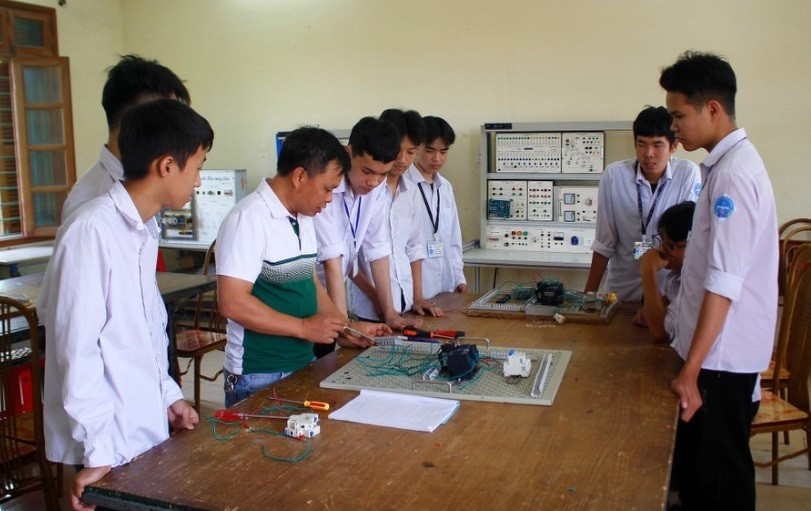
Synchronized solutions to realize goals
Despite many advances, vocational education still faces systematic difficulties. From practical experience in management and teaching, Mr. Dang Nguyen Manh and Mr. Duong The Bao both pointed out the main barriers such as many vocational education institutions having degraded and outdated facilities and teaching equipment.
The training system is still fragmented, the professions overlap, while the training of high-quality human resources is not really effective. The mechanism connecting schools and businesses is still limited; there is a lack of clear regulations and policies, leading to the output quality not meeting the actual needs of the market.
In addition, the awareness of a part of the people about the role of vocational education is not correct. The mentality of valuing degrees is still heavy, making vocational education difficult in recruiting excellent students and effectively implementing the work of streaming after junior high school and high school. The mobilization of investment resources and socialization for vocational education is not effective, not meeting the requirements of development...
Resolution 71 outlines a strategic vision and strong commitment, creating the premise to open a new era for vocational education in Vietnam. Breakthrough policies on autonomy, investment, business connection and digital transformation have created a legal corridor and a favorable environment for vocational education to truly become a driving force for development. To realize that vision and orientation, both the Principal of Thai Binh Vocational College and the Head of the Department of Continuing Education and Vocational Training (Hung Yen Department of Education and Training) said that a series of synchronous and drastic solutions are needed.
Firstly, it is necessary to invest heavily in modern facilities and equipment. This includes not only practice equipment but also digital infrastructure and open learning platforms. More importantly, the investment must be closely linked to regional and industry planning, ensuring that all resources are used effectively and in accordance with the development needs of each locality.
Second, it is necessary to focus on training and improving the professional qualifications and skills of the current teaching staff, especially digital skills and new technologies. At the same time, it is necessary to develop attractive policies to encourage experts and good engineers from businesses to participate in the teaching process.
Third, strong financial policies, such as credit support or tax incentives, are needed to encourage businesses to participate in training and receive interns. This not only helps learners have job opportunities but also ensures that training programs are always in line with the actual needs of the labor market.
Finally, a coordinated national media campaign is needed to change public perception of the value of skilled labor. Celebrate role models of skilled workers, artisans, and engineers to inspire and spread the value of vocational education throughout society.
“Resolution 71-NQ/TW emphasizes inclusiveness and social equity when allocating resources to organize high-quality vocational training programs for ethnic minorities and specific labor groups. This not only improves the quality of human resources but also narrows regional gaps, creating equal development opportunities.” - Mr. Tran Van Son - Principal of the College of Information and Communication
Source: https://giaoducthoidai.vn/nghi-quyet-71-xac-dinh-ro-nhung-buoc-di-mang-tinh-dot-pha-giao-duc-nghe-nghiep-post749659.html









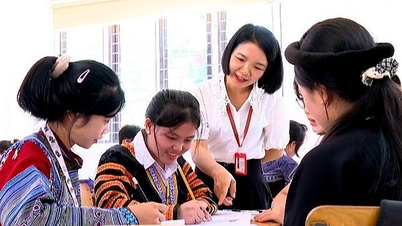

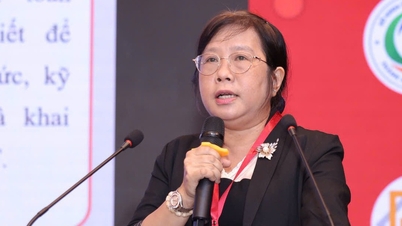













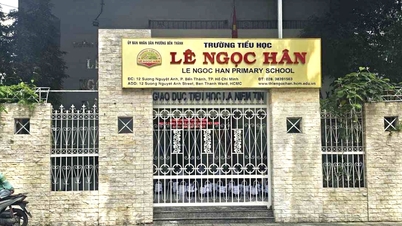






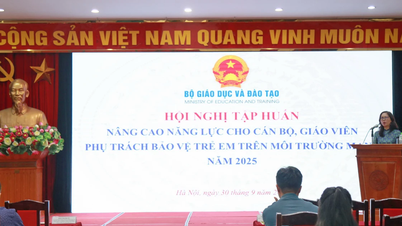
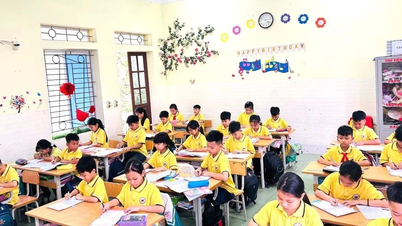



![[Photo] Solemn opening of the 12th Military Party Congress for the 2025-2030 term](https://vphoto.vietnam.vn/thumb/1200x675/vietnam/resource/IMAGE/2025/9/30/2cd383b3130d41a1a4b5ace0d5eb989d)
![[Photo] President Luong Cuong receives President of the Cuban National Assembly Esteban Lazo Hernandez](https://vphoto.vietnam.vn/thumb/1200x675/vietnam/resource/IMAGE/2025/9/30/4d38932911c24f6ea1936252bd5427fa)
![[Photo] The 1st Congress of Phu Tho Provincial Party Committee, term 2025-2030](https://vphoto.vietnam.vn/thumb/1200x675/vietnam/resource/IMAGE/2025/9/30/1507da06216649bba8a1ce6251816820)
![[Photo] Panorama of the cable-stayed bridge, the final bottleneck of the Ben Luc-Long Thanh expressway](https://vphoto.vietnam.vn/thumb/1200x675/vietnam/resource/IMAGE/2025/9/30/391fdf21025541d6b2f092e49a17243f)






































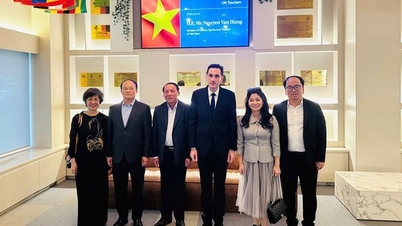






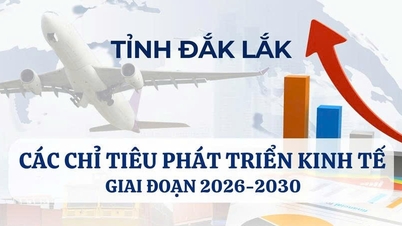
















Comment (0)